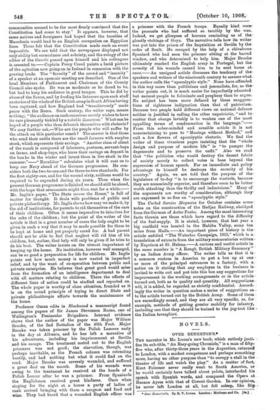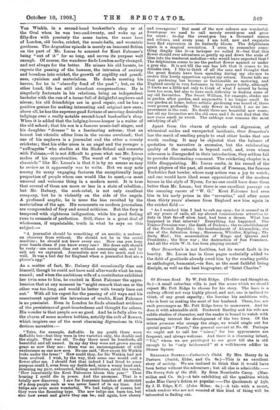NOVELS.
OVER BEMERTONTA
THE narrator in Mr. Lucas's new book, which entirely justi- fies its sub-title, "An Easy-going Chronicle," is a man of fifty- five who, after thirty-three years in the Argentine, returned to London, with a modest competence and perhaps something more, having no other purpose than "to occupy a stall in the theatre of life and watch the play." As a matter of fact, Kent Falconer never really went to South America, or he would certainly have talked about pelota, interlarded his speech with Spanish words, and compared the Opera at Buenos Ayres with that of Covent Garden. In our opinion, he never left London at all, but fell asleep, like Rip * Our Bomertozes. By E. V. Lucas. London ; Methuen and Co. [60.] Van Winkle, in a second-hand bookseller's shop or at the Oval when he was two-and-twenty, and woke up at
fifty-five with precisely the same tastes, the same love of London, old books, cricket, the music-halls, and eccentric goodness. The Argentine episode is merely an innocent fiction on the part of Mr. Lucas to account for Kent Falconer's being " out of it " for so long, and serves its purpose well enough. Of course, the wanderer finds London sadly changed, and not always for the better. He misses his old haunts, he regrets the passing of the hansom, the intrusion of anxiety and boredom into cricket, the growth of cupidity and greedi- ness, cynicism and materialism. He dreads meeting his heroes, for he is " absurdly fond of the past "; but, on the other band, life has still abundant compensations. He is singularly fortunate in his relations, being an independent bachelor with the run of a house full of delightful nephews and nieces; his old friendships are in good repair, and he has a positive genius for making interesting and original new ones; above all, he has the supreme good fortune of securing desirable lodgings over a really notable second-band bookseller's shop. When it is added that the lodging-house-keeper is a waiter of the old school ; that his son is a famous music-ball singer, and his daughter " dresser " to a fascinating actress; that an honest but vitriolic editor lives in the rooms overhead ; that one of his nephews is a journalist and the other a county cricketer; that his elder niece is an angel and the younger a " suffragette " who studies at the Slade School and consorts with Fabians,—it is not difficult to guess what use Mr. Lucas makes of his opportunities. The worst of an " easy-going
chronicle" like Mr. Lucas's is that it is by no means so easy to review as it apparently was to write. But we may note
among its many engaging features the exceptionally large proportion of people whom one would like to meet,—a most unusual and welcome thing in a modern novel. It is true that several of them are more or less in a state of rebellion ; but Mr. Dabney, the arch-rebel, is not only excellent company, but he is violently on the side of the angels. A professed sceptic, he is none the less revolted by the materialism of the age. His comments on modern journalism are compounded of fury and sound criticism. But the fury is tempered with righteous indignation, while his good feeling runs to counsels of perfection. Still, there is a great deal of wholesome, if unpalatable, truth in what he says on this subject :-
"A journalist should be something of an ascetic, a recluse: an observer from without. He should not be in the social machine ; he should not know every one. How can you keep your hands clean if you know every one? His dress suit should be rusty : one cannot dine out without consuming salt, and by salt are we captured. Journalists now eat too much and too well. It was a bad day for England when a journalist first ate a plover's egg."
As a matter of fact, Mr. Dabney did occasionally dine out himself, though be could not have said afterwards what he con- sumed ; and when the ambitious wife of a contributor exhibited
her twin sons to him, he excited in Kent Falconer the appre- hension that at any moment he " might remark that one or the other was too long, and would be better with twenty lines cut out." With all his regret for the passing of old ways and his
resentment against the intrusions of wealth, Kent Falconer is no pessimist. Even in London he finds abundant evidence of the persistence of good-heartedness and thought for others. His wonder is that people are so good. And he is fully alive to the charm of some modern hobbies, notably the cult of flowers, which inspires one of the most charming digressions in this devious narrative:-
" Take, for example, daffodils. In my youth there were daffodils too—but they were in two varieties only, the double and the single. That was all. To-day there must be hundreds, all beautiful and all named. In my day they were not grown among grass as now they are : there was no endouragement of wild exuberance as one now sees. No one said, 'How sweet Sir Watkin looks under the trees !' How could they, for Sir Watkin had not been evolved. I wish, by the way, that some one would call a flower after me. I should feel that indeed I had lived to some purpose could I, even from my death-bed, raise a weary head and, straining my po3r, exhausted, failing auditories, catch the words, 'How luxuriantly the Kent Falconers bloom this year !' Thus hearing I could die in peace. And the anemone. That is a totally new discovery. I saw for fourpence bunches of anemones of a deep purple such as was never heard of in my time. And tulips are even more wonderfuL We had tulips, of course, but they were the flaunting type. The new tulips can burn too, but also how sweet and grave they can be; and again, how cheery and courageous ! But most of the new colours are wonderful. Sweet-peas we used to call merely sweet-peas and grow for scent : to-day the sweet-pea has a thousand names and colours, and every year, I am told, new and exquisite hues find expression in its butterfly bloom. The delphinium again is a magical revelation. I seem to remember some- thing dingily like it—a larkspur we called it—but that this flower should ever adventure so gently up and down the scale of blue into the tenderest melodies—who would have expected that P The delphinium seems to me the perfect flower against or under a grey sky. It is not till the sun has left that it comes to its delicate own. I like to think of all the care and thought that the great florists have been spending during my absence to evolve this lovely apparition against my return. Naomi tells me that gardening has become as fashionable as motoring, and England surely is very fortunate in this pretty hobby, although it hurts me a little not only to think of what I missed by being born too soon, but also to have such difficulty in finding some of my old favourites. The Sweet William, for example, eludes mo in garden after garden, and mignonette I no longer smell. In our garden at home, before artistic gardening was heard of, these were grown profusely. The only flower in which I see no im- provement is tho rose. No doubt there are beautiful new roses ; but all any favourites are the old ones, and I do not find that the new roses smell as sweet. The cabbage rose remains the most satisfying of all."
Apart from the charm of episode and digression, of whimsical asides and unexpected incidents, Over Bemerton'e has the merit of sending people to read other books that are worth reading. It may be objected that the balance of quotation to narrative is excessive, but the exhilarating quality of the extracts is beyond cavil, and, even where relevance is disregarded in their introduction, they seldom fail to provoke illuminating comment. The cricketing chapter is a little disappointing. Mr. Lucas omits, in his record of the great players of the past, all mention of Freeman, the famous Yorkshire fast bowler, whose easy action was a joy to watch ; and one would have liked some appreciations of the modern
heroes in the style of Nyren, for no one could have done them better than Mr. Lucas; but there is one excellent passage en the amazing career of " W. G." Kent Falconer bad seen him in his early prime in the " seventies," and after more than thirty years' absence from England saw him again in the cricket field :-
" As I watched him I had to rub my eyes ; for it seemed as if all my years of exile, all my absurd conscientious attention to duty in that far-off alien land, had been a dream. What has happened in that interval? Everything has happened. The Franco-Prussian war; the death of Dickens ; the re-establishment of the French Republic ; the bombardment of Alexandria ; the rise of the Salvation Army ; Stevenson, Whistler, Kipling ; The Daily Mail ; the assassination of Kings and Queens and Presidents ; the Boer war ; the destruction of San Francisco. And all the while W. G. has been playing cricket."
Over Bemerton's is not faultless, but its worst fault is its brevity. Mr. Lucas has in these pages materially added to the debt of gratitude already owed him by the reading public, as anthologist, humanist, in fine, as the most faithful living disciple, as well as the best biographer. of "Saint Charles."















































 Previous page
Previous page